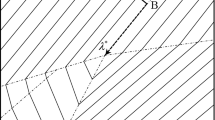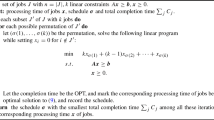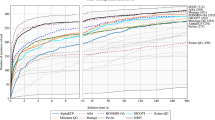Abstract
We present a method for computing lower bounds in the progressive hedging algorithm (PHA) for two-stage and multi-stage stochastic mixed-integer programs. Computing lower bounds in the PHA allows one to assess the quality of the solutions generated by the algorithm contemporaneously. The lower bounds can be computed in any iteration of the algorithm by using dual prices that are calculated during execution of the standard PHA. We report computational results on stochastic unit commitment and stochastic server location problem instances, and explore the relationship between key PHA parameters and the quality of the resulting lower bounds.



Similar content being viewed by others
References
Ahmed, S., Tawarmalani, M., Sahinidis, N.V.: A finite branch and bound algorithm for two-stage stochastic integer programs. Math. Program. Ser. A 100(2), 355–377 (2004)
Boyd, S., Parihk, N., Chu, E., Peleato, B., Eckstein, J.: Distributed optimization and statistical learning via the alternating direction method of multipliers. Found Trends Mach Learn 3, 1–22 (2011)
Carøe, C.C., Schultz, R.: Dual decomposition in stochastic integer programming. Oper. Res. Lett. 24(1), 37–45 (1999)
Carrión, M., Arroyo, J.M.: A computationally efficient mixed-integer linear formulation for the thermal unit commitment problem. IEEE Trans. Power Syst. 21(3), 1371–1378 (2006)
Cheung, K., Gade, D., Monroy, C.S., Ryan, S.M., Watson, J.P., Wets, R.J.B., Woodruff, D.L.: Scalable stochastic unit commitment, part 2: solver performance. Energy Syst. 6, 309–329 (2015)
Cormican, K.J., Morton, D.P., Wood, R.K.: Stochastic network interdiction. Oper. Res. 46(2), 184–197 (1998)
Crainic, T., Hewitt, M., Rei, W.: Scenario grouping in a progressive hedging-based meta-heuristics for stochastic network design. Comput. Oper. Res. 43, 90–99 (2014)
Dantzig, G.B., Wolfe, P.: Decomposition principle for linear programs. Oper. Res. 8(1), 101–111 (1960)
Eichhorn, A., Heitsch, H., Römisch, W.: Stochastic optimization of electricity portfolios: Scenario tree modeling and risk management. In: Rebennack, S., Pardalos, P.M., Pereira, M.V.F., Iliadis, N.A. (eds.) Handbook of Power Systems II, Energy Systems, pp. 405–432. Springer, Berlin (2010). doi:10.1007/978-3-642-12686-4_15
Ela, E., Milligan, M., O’Malley, M.: A flexible power system operations simulation model for assessing wind integration. In: 2011 IEEE Power and Energy Society General Meeting. IEEE, New York (2011)
Escudero, L., Garn, A., Prez, G., Unzueta, A.: Scenario cluster decomposition of the lagrangian dual in stochastic mixed 0–1 optimization. Comput. Oper. Res. 40, 362–377 (2013)
Guignard, M., Kim, S.: Lagrangean decomposition: a model yielding stronger lagrangean bounds. Math. Program. 39(2), 215–228 (1987)
Guo, G., Hackebeil, G., Ryan, S., Watson, J., Woodruff, D.: Integration of progressive hedging and dual decomposition in stochastic integer programs. Oper. Res. Lett. 43, 311–316 (2015)
Hart, W., Watson, J., Woodruff, D.: Pyomo: Modeling and solving mathematical programs in Python. Math. Program. Comput. 3(3), 219–260 (2011)
Held, H., Hemmecke, R., Woodruff, D.L.: A decomposition algorithm applied to planning the interdiction of stochastic networks. Naval Res. Logist. (NRL) 52(4), 321–328 (2005)
Hiriart-Urruty, J.B., Lemaréchal, C.: Convex Analysis and Minimization Algorithms. Springer, Berlin (1993)
Janjarassuk, U., Linderoth, J.: Reformulation and sampling to solve a stochastic network interdiction problem. Networks 52(3), 120–132 (2008)
Kaut, M., Wallace, S.: Evaluation of scenario-generation methods for stochastic programming. Pac. J. Optim. 3(2), 257–271 (2007)
Løkketangen, A., Woodruff, D.L.: Progressive hedging and tabu search applied to mixed integer (0, 1) multistage stochastic programming. J. Heuristics 2, 111–128 (1996)
Lubin, M., Martin, K., Petra, C., Sandıkçı, B.: On parallelizing dual decomposition in stochastic integer programming. Oper. Res. Lett. 41(3), 252–258 (2013)
Lulli, G., Sen, S.: A branch-and-price algorithm for multistage stochastic integer programming with application to stochastic batch-sizing problems. Manag. Sci. 50(6), 786–796 (2004)
Märkert, A., Gollmer, R.: User’s Guide to ddsip-AC Package for the Dual Decomposition of Two-Stage Stochastic Programs with Mixed-Integer Recourse. Department of Mathematics, University of Duisburg-Essen, Duisburg (2008)
Meyer, R.R.: On the existence of optimal solutions to integer and mixed-integer programming problems. Math. Program. 7(1), 223–235 (1974)
Morales-Espana, G., Latorre, J.M., Ramos, A.: Tight and compact MILP formulation for the thermal unit commitment problem. IEEE Trans. Power Syst. 21, 4897–4908 (2013)
Mulvey, J.M., Vladimirou, H.: Applying the progressive hedging algorithm to stochastic generalized networks. Ann. Oper. Res. 31, 399–424 (1991)
Mulvey, J.M., Vladimirou, H.: Solving multistage stochastic networks: an appplication of scenario aggregation. Networks 21, 619–643 (1991)
Nemhauser, G.L., Wolsey, L.A.: Integer and Combinatorial Optimization, vol. 27. Wiley, New York (1988)
Ntaimo, L., Sen, S.: The million-variable march for stochastic combinatorial optimization. J. Glob. Optim. 32, 385–400 (2005)
Papavasiliou, A., Oren, S.S.: Multiarea stochastic unit commitment for high wind penetration in a transmission constrained network. Oper. Res. 61(3), 578–592 (2013)
Pflug, G.C., Pichler, A.: Approximations for probability distributions and stochastic optimization problems. In: Bertocchi, M., Consigli, G., Dempster, M.A. (eds.) Stochastic Optimization Methods in Finance and Energy, International Series in Operations Research and Management Science. Springer, Berlin (2011)
Rockafellar, R.T., Wets, R.J.B.: Scenarios and policy aggregation in optimization under uncertainty. Math. Oper. Res. 16(1), 119–147 (2004)
Ruiz, P.A., Philbrick, R.C., Zack, E., Cheung, K.W., Sauer, P.W.: Uncertainty management in the unit commitment problem. IEEE Trans. Power Syst. 24(2), 642–651 (2009)
Ryan, S.M., Wets, R.J.B., Woodruff, D.L., Silva-Monroy, C., Watson, J.P.: Toward scalable, parallel progressive hedging for stochastic unit commitment. In: 2013 IEEE Power and Energy Society General Meeting. IEEE, New York (2013)
Santoso, T., Ahmed, S., Goetschalckx, M., Shapiro, A.: A stochastic programming approach for supply chain network design under uncertainty. Eur. J. Oper. Res. 167(1), 96–115 (2005)
Shor, N.Z., Kiwiel, K.C., Ruszczynski, A.: Minimization Methods for Non-differentiable Functions, vol. 3. Springer, Berlin (1985)
Sun, J., Tesfatsion, L.: Dynamic testing of wholesale power market designs: an open-source agent-based framework. Comput. Econ. 30(3), 291–327 (2007)
Takriti, S., Birge, J.R., Long, E.: A stochastic model for the unit commitment problem. IEEE Trans. Power Syst. 11(3), 1497–1508 (1996)
van der Vlerk, M.H.: Stochastic integer programming bibliography. http://www.eco.rug.nl/mally/biblio/sip.html (1996–2007)
Watson, J., Woodruff, D., Hart, W.: PySP: Modeling and solving stochastic programs in Python. Math. Program. Comput. 4(2), 109–149 (2012)
Watson, J.P., Woodruff, D.L.: Progressive hedging innovations for a class of stochastic mixed-integer resource allocation problems. Comput. Manag. Sci. 8(4), 355–370 (2011)
Wets, R.J.B.: On the relation between stochastic and deterministic optimization. In: Bensoussan, A., Lions, J.L. (eds.) Control Theory, Numerical Methods and Computer Systems Modelling, pp. 350–361. Springer, Berlin (1975)
Wets, R.J.B.: The aggregation principle in scenario analysis and stochastic optimization. In: Wallace, S.W. (ed.) Algorithms and Model Formulations in Mathematical Programming, pp. 91–113. Springer, Berlin (1989)
Author information
Authors and Affiliations
Corresponding author
Additional information
This research was sponsored in part by the US Department of Energy’s ARPA-e Green Energy Network Integration (GENI) program, and by the Department of Energy’s Office of Science, Advanced Scientific Computing Research program. Thanks to Ge Guo for assistance with the numerical results. Sandia is a multi-program laboratory operated by Sandia Corporation, a Lockheed Martin Company, for the United States Department of Energy’s National Nuclear Security Administration under Contract DE-AC04-94-AL85000.
Rights and permissions
About this article
Cite this article
Gade, D., Hackebeil, G., Ryan, S.M. et al. Obtaining lower bounds from the progressive hedging algorithm for stochastic mixed-integer programs. Math. Program. 157, 47–67 (2016). https://doi.org/10.1007/s10107-016-1000-z
Received:
Accepted:
Published:
Issue Date:
DOI: https://doi.org/10.1007/s10107-016-1000-z




